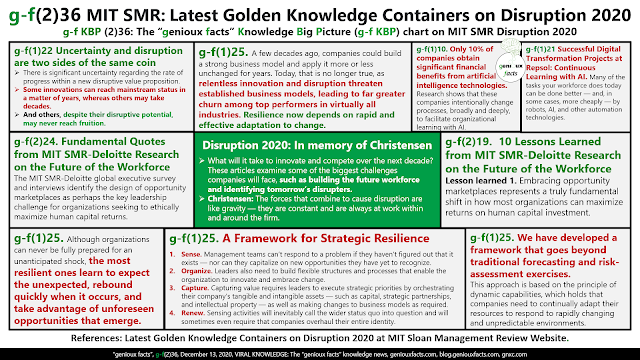Extra-condensed knowledge
- These articles examine some of the biggest challenges companies will face, such as building the future workforce and identifying tomorrow’s disrupters.
- Clayton M. Christensen: The forces that combine to cause disruption are like gravity — they are constant and are always at work within and around the firm.
- Some innovations can reach mainstream status in a matter of years, whereas others may take decades.
- And others, despite their disruptive potential, may never reach fruition.
Condensed knowledge
- Disruption 2020: In memory of Clayton M. Christensen.
- What will it take to innovate and compete over the next decade?
- These articles examine some of the biggest challenges companies will face, such as building the future workforce and identifying tomorrow’s disrupters.
- Christensen: The forces that combine to cause disruption are like gravity — they are constant and are always at work within and around the firm.
- g-f(1)22 Uncertainty and disruption are two sides of the same coin.
- There is significant uncertainty regarding the rate of progress within a new disruptive value proposition.
- Some innovations can reach mainstream status in a matter of years, whereas others may take decades.
- And others, despite their disruptive potential, may never reach fruition.
- g-f(1)25 A framework that goes beyond traditional forecasting and risk-assessment exercises. A few decades ago, companies could build a strong business model and apply it more or less unchanged for years. Today, that is no longer true, as relentless innovation and disruption threaten established business models, leading to far greater churn among top performers in virtually all industries.
- Resilience now depends on rapid and effective adaptation to change.
- Although organizations can never be fully prepared for an unanticipated shock, the most resilient ones learn to expect the unexpected, rebound quickly when it occurs, and take advantage of unforeseen opportunities that emerge.
- We have developed a framework that goes beyond traditional forecasting and risk-assessment exercises. This approach is based on the principle of dynamic capabilities, which holds that companies need to continually adapt their resources to respond to rapidly changing and unpredictable environments.
- A Framework for Strategic Resilience.
- Sense. Management teams can’t respond to a problem if they haven’t figured out that it exists — nor can they capitalize on new opportunities they have yet to recognize.
- Organize. Leaders also need to build flexible structures and processes that enable the organization to innovate and embrace change.
- Capture. Capturing value requires leaders to execute strategic priorities by orchestrating their company’s tangible and intangible assets — such as capital, strategic partnerships, and intellectual property — as well as making changes to business models as required.
- Renew. Sensing activities will inevitably call the wider status quo into question and will sometimes even require that companies overhaul their entire identity.
- g-f(2)19 10 Lessons Learned from MIT SMR-Deloitte Research on the Future of the Workforce.
- Lesson learned 1. Embracing opportunity marketplaces represents a truly fundamental shift in how most organizations can maximize returns on human capital investment.
- g-f(2)24 Fundamental Quotes from MIT SMR-Deloitte Research on the Future of the Workforce. The MIT SMR-Deloitte global executive survey and interviews identify the design of opportunity marketplaces as perhaps the key leadership challenge for organizations seeking to ethically maximize human capital returns.
- g-f(1)10 Companies obtain significant financial benefits from AI when the strategic focus is organizational learning, not just machine learning. Only 10% of companies obtain significant financial benefits from artificial intelligence technologies. Research shows that these companies intentionally change processes, broadly and deeply, to facilitate organizational learning with AI.
- g-f(1)21 Successful Digital Transformation Projects at Repsol: Continuous Learning with AI. Many of the tasks your workforce does today can be done better — and, in some cases, more cheaply — by robots, AI, and other automation technologies.
Category 2: The Big Picture of the Digital Era
[genioux fact extracted from MIT SMR]
Type of validity of the "genioux fact".
- Inherited from sources + Supported by the knowledge of one or more experts + Based on a research + Supported by a survey.
Authors of the genioux fact
References
- The MIT Sloan Management Review is a research-based magazine and digital platform for business executives published at the Massachusetts Institute of Technology. The print edition is published quarterly; the digital edition is updated daily.
- Content is presented in five main sections:
- Editor's Column: A one-page article from the editor-in-chief exploring a topic of current interest for business executives.
- Frontiers: Shorter articles that explore how digital technology is reshaping the practice of management.
- Special Report: Covering several articles on one specific area.
- Research Features: 3,000–5,000 word articles featuring new research and its implications for business executives.
- Executive Briefings: Synopsis and summary of articles in the publication.
- Columns: Opinion essays that appear in the back of the magazine.
- MIT SMR. About. At MIT Sloan Management Review (MIT SMR) we share with our readers an excitement and curiosity about how the practice of management is transforming in the digital age.
- Our expert contributors help leaders explore the trends that are shaping how organizations operate, compete, and create value in a technology-fueled world.
- We deliver the kind of evidence-based analysis and practical insight that will inspire leaders to do great work.
- We distribute our content on the web, in print, in audio podcast, and in apps, as well as via licensees and libraries around the world.
- The Team. Masthead & Credits.
- Managing Director. Robert W. Holland, Jr.
- Editor in Chief. Paul Michelman.
- Head of Planning, Digital, and Marketing. Deborah I. Gallagher.
- Editorial Director. David Kiron.
- Executive Editor. Elizabeth Heichler.
- Contact Us. Please let us know your questions, concerns or problems. Subscriptions, reprints, back issues, permissions requests.



